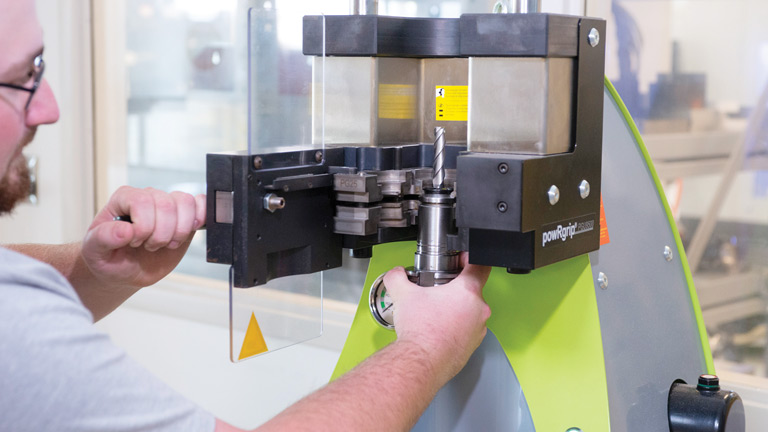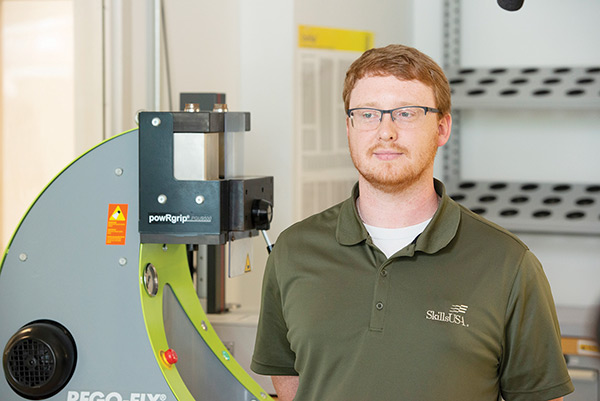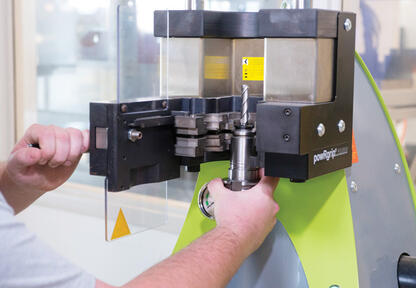Curriculum for Advanced Toolholding
Manufacturers continue to contend with a shrinking pool of skilled workers while the skill requirements for entry-level factory positions grow more demanding. Making matters worse, most employers lack the time and resources needed to prepare new employees for present-day shop floor work. Curriculum for Advanced Toolholding.
To overcome this challenging labor environment, state and public-private partnerships support the Institute for Advanced Learning and Research (IALR) in Danville, Va. IALR engages the resources of Virginia Tech, Danville Community College, Averett University, and other local technical and educational partners to grow five program areas—applied research, advanced learning, economic development, manufacturing advancement and conference services.

With a goal of keeping the manufacturing talent pipeline filled, the institute’s Manufacturing Advancement team, in partnership with Danville Community College, offers the Integrated Machining Technology (IMT) program, which supplements typical two-year community college machinist training with an additional year of expanded education in machine technology, leadership and cost management.
Another Manufacturing Advancement program is the 16-week “Accelerated Training in Defense Manufacturing” course that addresses the needs of skilled manufacturing workers in the Department of Defense, especially in submarine production activities. Civilian government employees are the main participants in this program, as well as active-duty, retired and non-active veterans seeking manufacturing jobs.
Back to Basics and Beyond
As part of IMT’s advanced tooling application classes, students study different tooling products and systems. For example, basic machining classes sometimes focus on standard ER-style collets and toolholders. The IMT curriculum, however, also covers tooling systems engineered for higher productivity, including Rego-Fix AG’s powRgrip toolholding system.
That system utilizes a special, shallow-tapered collet pressed into a holder with a matching taper. A tabletop powRgrip mounting unit inserts the collets with up to 9 tons of force to provide strong clamping performance and reliable torque transfer. System TIR is <0.0001″ (0.0025 mm).
The IALR uses the powRgrip system to provide an introduction to high-productivity machining of difficult materials. Knowledge of the performance advantages of advanced tooling helps prepare students for applications they will encounter when working in modern shops.
Getting Started
Students enter IALR’s IMT program after completing one or two years in a college-level machining course. “They then come out of our program with a minimum of five industry certifications along with their associate degree,” explains Dylan Hardy, IALR’s manager of training technology.
In the fall semester of the IMT program, students become familiar with a wide array of sophisticated machines available in the IALR shops, including:
- EDM
- CNC grinding
- Multi-axis machines
- Dual-spindle lathes

Students also gain advanced CAD/CAM skills, leadership training and take courses that cover cost management aspects of shop operation.
Cost Control
IALR stresses the old adage of time is money—or, as Hardy puts it, every second and minute is a dollar saved. “This encompasses advanced toolholding systems such as Rego-Fix powRgrip, which provides ease of use and speed to help reduce setup times, while also ensuring the highest precision possible,” Hardy says.
What makes the IMT program unique is that each class is run in a seminar style, running for two to three weeks of eight-hour class days followed by an exam. Another exam is held after a few more weeks on another subject, and so on throughout the semester.
In the second semester of the IMT program, students learn about machine shop organization, management and process flow. Participants rotate through positions in the manufacturing process from production leader to setup person to machine operator. They also move beyond single-item part machining to the production of multiple parts and assemblies.
Well-Rounded Experience
The experience gives students perspective on all aspects of a manufacturing operation and prepares them for management positions, according to Hardy.
IALR continually adds new machining technologies to its curriculum to ensure programs remain current. In support of these efforts, industry partners provide their most recent machine tool and tooling technology products.

“We are always looking for something new,” Hardy says. “If we don’t constantly improve the programs, we are going to fall behind industry.”
For example, IALR is adding mechatronics and automation technologies that will enable students to run more than one machine at a time.
As part of the decision-making process to choose new technologies, the Manufacturing Advancement team meets with local manufacturers to learn what shops may need next in terms of skilled personnel. “Engaging with local manufacturers is a key attribute to all of our programs,” Hardy adds.
The end result is a renowned workforce development program for advanced precision machining, notes Tim Robertson, chief operating officer for the Institute’s Manufacturing Advancement division. He attributes this to solid partnerships, cutting-edge equipment, an innovative experiential program and a pipeline starting as early as middle school—all of which continues to strengthen the program’s presence and extend its reach.
Source: Curriculum for Advanced Toolholding
https://www.techedmagazine.com/category/news-by-industry/manufacturing-education/
https://www.sme.org/technologies/articles/2024/january/instituting-a-curriculum-for-advanced-toolholding/

